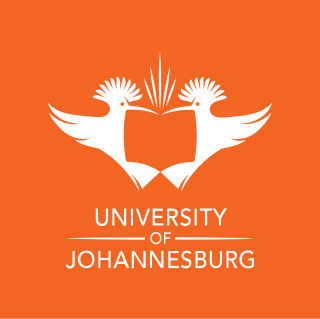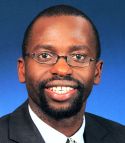
In microeconomics, supply and demand is an economic model of price determination in a market. It postulates that, holding all else equal, in a competitive market, the unit price for a particular good, or other traded item such as labor or liquid financial assets, will vary until it settles at a point where the quantity demanded will equal the quantity supplied, resulting in an economic equilibrium for price and quantity transacted. It forms the theoretical basis of modern economics.
The technological singularity—or simply the singularity—is a hypothetical point in time at which technological growth becomes uncontrollable and irreversible, resulting in unforeseeable changes to human civilization. According to the most popular version of the singularity hypothesis, called intelligence explosion, an upgradable intelligent agent will eventually enter a "runaway reaction" of self-improvement cycles, each new and more intelligent generation appearing more and more rapidly, causing an "explosion" in intelligence and resulting in a powerful superintelligence that qualitatively far surpasses all human intelligence.

In the card game of poker, a bluff is a bet or raise made with a hand which is not thought to be the best hand. To bluff is to make such a bet. The objective of a bluff is to induce a fold by at least one opponent who holds a better hand. The size and frequency of a bluff determines its profitability to the bluffer. By extension, the phrase "calling somebody's bluff" is often used outside the context of poker to describe situations where one person demands that another proves a claim, or proves that they are not being deceptive.
Bounded rationality is the idea that rationality is limited when individuals make decisions. In other words, humans' "...preferences are determined by changes in outcomes relative to a certain reference level..." as stated by Esther-Mirjam Sent (2018) Limitations include the difficulty of the problem requiring a decision, the cognitive capability of the mind, and the time available to make the decision. Decision-makers, in this view, act as satisficers, seeking a satisfactory solution, rather than an optimal solution. Therefore, humans do not undertake a full cost-benefit analysis to determine the optimal decision, but rather, choose an option that fulfils their adequacy criteria.

The efficient-market hypothesis (EMH) is a hypothesis in financial economics that states that asset prices reflect all available information. A direct implication is that it is impossible to "beat the market" consistently on a risk-adjusted basis since market prices should only react to new information.

The School of Computer Science (SCS) at Carnegie Mellon University in Pittsburgh, Pennsylvania, US is a school for computer science established in 1988. It has been consistently ranked among the top computer science programs over the decades. U.S. News & World Report currently ranks the graduate program as tied for 1st with Massachusetts Institute of Technology, Stanford University, and University of California, Berkeley. It is ranked 1st in the United States on Computer Science Open Rankings, which combines scores from multiple independent rankings.
Hans Peter Moravec is an adjunct faculty member at the Robotics Institute of Carnegie Mellon University in Pittsburgh, USA. He is known for his work on robotics, artificial intelligence, and writings on the impact of technology. Moravec also is a futurist with many of his publications and predictions focusing on transhumanism. Moravec developed techniques in computer vision for determining the region of interest (ROI) in a scene.

In contract theory and economics, information asymmetry deals with the study of decisions in transactions where one party has more or better information than the other. This asymmetry creates an imbalance of power in transactions, which can sometimes cause the transactions to be inefficient causing market failure in the worst case. Examples of this problem are adverse selection, moral hazard, and monopolies of knowledge.
Igor Aleksander FREng is an emeritus professor of Neural Systems Engineering in the Department of Electrical and Electronic Engineering at Imperial College London. He worked in artificial intelligence and neural networks and designed the world's first neural pattern recognition system in the 1980s.

The University of Johannesburg (UJ) is a public university located in Johannesburg, South Africa. The University of Johannesburg came into existence on 1 January 2005 as the result of a merger between the Rand Afrikaans University (RAU), the Technikon Witwatersrand (TWR) and the Soweto and East Rand campuses of Vista University. Prior to the merger, the Daveyton and Soweto campuses of the former Vista University had been incorporated into RAU. As a result of the merger of Rand Afrikaans University (RAU), it is common for alumni to refer to the university as RAU. The Vice-Chancellor and Principal of UJ is Professor Tshilidzi Marwala who took office on 1 January 2018. Between 2005 and 2017, UJ's Vice-Chancellor and Principal was Prof Ihron Lester Rensburg.

Tshilidzi Marwala is a South African mechanical engineer and computer scientist. He became Professor at the University of the Witwatersrand in 2003 and also chairperson of System and Control Engineering in South Africa. He has previously worked at the CSIR and for South African Breweries.
Hector Levesque is a Canadian academic and researcher in artificial intelligence.
Artificial intelligence, defined as intelligence exhibited by machines, has many applications in today's society. More specifically, it is Weak AI, the form of AI where programs are developed to perform specific tasks, that is being utilized for a wide range of activities including medical diagnosis, electronic trading platforms, robot control, and remote sensing. AI has been used to develop and advance numerous fields and industries, including finance, healthcare, education, transportation, and more.

Carl Eddie Hewitt is an American computer scientist who designed the Planner programming language for automated planning and the actor model of concurrent computation, which have been influential in the development of logic, functional and object-oriented programming. Planner was the first programming language based on procedural plans invoked using pattern-directed invocation from assertions and goals. The actor model influenced the development of the Scheme programming language, the π-calculus, and served as an inspiration for several other programming languages.
Informatics is the study of computational systems, especially those for data storage and retrieval. According to ACM Europe andInformatics Europe, informatics is synonymous with computer science and computing as a profession, in which the central notion is transformation of information. In other countries, the term "informatics" is used with a different meaning in the context of library science.
The Lewis turning point is a situation in economic development where surplus rural labor is fully absorbed into the manufacturing sector. This typically causes agricultural and unskilled industrial real wages to rise. The term is named after economist W. Arthur Lewis. Shortly after the Lewis point, an economy requires balanced growth policies.

Fulufhelo Vincent Nelwamondo (OMS) is an electrical engineer by training, and holds a PhD in Electrical Engineering from the University of the Witwatersrand, in South Africa. He is the youngest recipient of the Harvard-South Africa Fellowship Programme amongst other honours. His research and practical experience has covered a wide spectrum of areas, including software engineering and computational intelligence. His interests include biometrics-based systems, data mining and machine learning tools.
This glossary of artificial intelligence is a list of definitions of terms and concepts relevant to the study of artificial intelligence, its sub-disciplines, and related fields. Related glossaries include Glossary of computer science, Glossary of robotics, and Glossary of machine vision.
Megan Jill Russell is a Biomedical and Electrical engineer based in Johannesburg, South Africa. She is popularly known for inventing an artificial larynx which was featured by MIT Technology Review, but perhaps more importantly, she is involved in the development of methods of Computer-assisted detection of Tuberculosis.
David C. Parkes is a British-American computer scientist, conducting research at the interface between computer science and economics, with a focus on multi-agent systems, artificial intelligence, game theory and market design. He is the George F. Colony Professor of Computer Science and Co Faculty Director of the Harvard Data Science Initiative. From 2013–17, he was Area Dean for Computer Science. Parkes is a Fellow of the Association for the Advancement of Artificial Intelligence (AAAI) and the Association for Computing Machinery (ACM).








